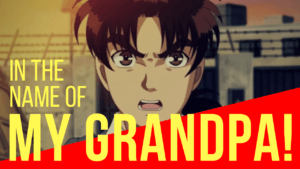Let’s learn Japanese with Bertolt Hoover’s quote from Attack on Titan (Shingeki no Kyojin).
CONTENTS
Video ***SPOILER ALERT!***
Bertolt Hoover’s Quote
Japanese: やるんだな!?今!ここで!
Romaji: yaru nda na? ima! koko de!
English: Are we doing it?! Right now?! Right here?!
Analysis
やる means “to do some action”. You might know that both やる and する mean “to do” but when you refer to a particular action without stating exactly which one, usually やる is used.
んだ is the broken version of のだ. When it’s used in a question sentence, it implies the speaker wants clarification based on the background or context. So in this scene, the context is that Bertolt sees Reiner talking about a secret they never told anyone and he wants to clarify that they are really going to reveal the secret as Reiner didn’t tell him to, directly or clearly.
な is the sentence ending particle which indicates request for confirmation or agreement from the listener in male speech. In female speech, ね is used instead.
今 means “now”.
ここ means “here” and で is the particle for a location where the action will be taken.
So the whole sentence is supposed to be 今ここでやるんだな? meaning “Are we doing it right now right here?” but he separated the words and changed the word order to make sure that they are really going to do it “RIGHT NOW” “RIGHT HERE”. The nuance gets stronger as you add the words. It also sounds more dramatic than the normal word order.
Examples
やる (to do some action)
このゲームすごく面白いよ。やってみる?
kono gēmu sugoku omoshiroi yo. yatte miru?
This game is very fun! Do you want to play it?
そのアプリで占いできるの?やるやる!
sono apuri de uranai dekiru no? yaru yaru!
Can you do fortune telling on that app? I’ll do it, I’ll do it!
宿題したの?部屋の掃除は? – 後でやるよ!
shukudai shita no? heya no sōji wa? – ato de yaru yo!
Did you do your homework? How about cleaning your room? – I’ll do it later!
んだ + な/ね in Question (seek clarification based on background/context)
verb + んだ
このゲームが終わったら宿題するんだな?
kono gēmu ga owattara shukudai suru nda na?
You are doing your homework after finishing this game?
i-adjective + んだ
コーヒーと紅茶もあるけど、お水でいいんだね?
kōhī to kōcha mo aru kedo, omizu de ii nda ne?
I have coffee and tea as well but you’re sure you’re fine with water?
na-adjective + な + んだ
これ食べても大丈夫なんだね?
kore tabetemo daijōbu na nda ne?
Are you sure this is OK to eat?
noun + な + んだ
その話は本当なんだね?
sono hanashi wa hontō na nda ne?
Is that story true?
- “んだ + な/ね” is used when you can guess the answer based on the background or context but you want clarification just in case. When there is no background or context and simply want to know the fact, plain-form is used in casual speech (in polite speech, simple verb “masu-form” or “adjective/noun + desu” is used).
(There is no context and you just want to know the fact that the person is a student)
学生?
gakusei?
Are you a student?
(After you saw the student ID and you still want to clarify the person is really a student)
学生なんだね?
gakusei na nda ne?
So you ARE a student?
- んだ is used when you have more certainty. If you are less certain, の is used.
(After you saw the student ID but it looks fake and it’s hard to believe that the person is a student)
本当に学生なの?
hontō ni gakusei nano?
Are you really a student?
- In real life, males use ね as well, as it’s becoming more genderless.
- In formal speech, only ね is used.
Correct: 学生なんですね?
Wrong: 学生なんですな? (It’s sometimes used in anime as an old person’s speech)
So you ARE a student?
Support Easy Peasy Japanesey
If you enjoy our content, please consider supporting Easy Peasy Japanesey. Your support will help keep us going. Thanks for all your support!



Isn’t the official english translation “attack on titan” for “進撃の巨人” actually somewhat wrong?
Because from what I understood from the manga 進撃の巨人 is not referring to “an attack on a titan” but on the “attack titan” that Eren holds. Since の is used more as a combiner for 進撃 and 巨人 shouldn’t の be omitted during translation in general?
Yes, you are right. If 進撃の巨人 is directly translated, it should be “Attacking Giant” or “Giant Who Attacks” (as the の particle works not only as a combiner but also as a modifier). I heard that they made it “Attack on Titan” because it’s “catchy” whether it’s translated correctly or not, which I think is pretty ok.
Could you make a video of what Reiner says before this.
“But the only choice for me now.. is to face the consequences of my actions.. and as a warrior.. fulfill my duty to the bitter end!”
Please thank you!!
Added to our list. Thanks so much for your request!